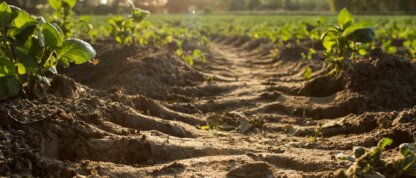
Why calculating the changes in soil carbon stocks matter?

The increase in soil carbon stocks increases diversity and nutrients in the soil. Farmers are interested in increasing the diversity of the soil, because nutrient-rich soil increases the profitability of farming – meaning more money for the farmer. In addition, soil plays an important role in mitigating climate change, as it stores more organic carbon than plants.
Plants absorb carbon dioxide from the atmosphere as they grow, and their roots release various organic compounds into the soil. Part of the carbon in the atmosphere is thus transformed into organic compounds that increase the soil’s nutrient content and form a long-term carbon sink. Both the farmer and the climate remain satisfied!
Several different factors, such as the weather and farming activity with their timing, affect both the harvest and the accumulation of carbon. Increasing the organic matter of the soil also increases the crop reliability of field, in addition to improving crop production.
A functioning soil water management and structure are a prerequisite for the field to be able to bind carbon. With the help of the new calculation method, a more accurate picture can be formed of how different farming actions will affect the field’s carbon stocks.
Development Manager Sari Peltonen, ProAgria

Information about soil carbon stocks helps the farmer make wiser choices
Effective carbon sequestration in the soil improves yields and reduces atmospheric carbon dioxide. But on the flip side of the coin, reducing organic matter means that carbon dioxide is released into the atmosphere. It is a vicious circle where the profitability of farmland decreases, and climate emissions caused by land use increase.
Farmers can calculate the change in soil carbon stock with Biocode’s free calculation tools. Now more and more farmers in Finland can use the solution even more easily, as the Biocode’s calculator is connected to the crop planning software called Minun Maatilani Wisu. Thanks to the integration, the calculation can be done by pressing a few buttons in Wisu, when the cultivation information is up to date.
Making coal visible in Minun Maatilani Wisu is a natural addition to the functionality. Since several issues during the growing season contribute to the yield and the change in the carbon stock of the soil, evaluation must be possible already in the planning phase. The new tool gives a new perspective to the development of farming practices.
Wisu product manager Jani Kivipelto, Mtech Oy
A view of the changes in the soil carbon stock of a field helps the farmer to understand the effect of various cultivation actions on the amount of organic matter in the soil and how carbon sequestration can be increased.
By changing farming operations, the farmer can increase the financial result and at the same time make climate-wise choices. Climate measures must also be taken as part of profitable plant production. The already existing carbon footprint calculation and the now complementary soil carbon stock calculation are the best tools for that.
CEO Ernesto Hartikainen, Biocode

Calculating the effects of farming methods on soil carbon stocks used to be difficult and time-consuming. That’s why there is a demand for easy-to-use and handy tools in the everyday lives of busy farmers and farming advisors. When the farmer knows which measures influence changes in the soil’s carbon stocks, they can make both climate and financially wise decisions.
Calculation of soil carbon stock contains uncertainties. Counting is currently being studied in Finland and internationally. Research information is increasing all the time, and Biocode’s online calculator is improved according to the latest information and updated calculation instructions.
📘 Read what the carbon footprint calculator is based on
How can a farmer increase the amount of organic matter in the soil?
In Biocode’s carbon footprint calculator, the effects of farming methods on the change in carbon stocks are calculated with many factors such as: crop rotations, tillage methods, nitrogen-fixing plants and fertilization. If the farmer uses MM Wisu and the cultivation information is up to date, this information can be automatically sent to the calculator and the changes in the soil’s carbon stock can be seen directly in Wisu.
The farmer can increase the amount of carbon stock and soil organic matter on fields in many ways, for example:
- Leave straw or crop residues in the field after harvesting
- Sow winter crops or cover / collector plants in the field
- Include grass in the crop rotation
- Include nitrogen-fixing plants in the crop rotation
- Use green manure and cattle manure for fertilization
Are you interested in calculating the block-specific carbon footprint or the change in soil carbon reserves?
Start using Biocode’s free producer calculator by signing up below or try the calculation in Minun Maatilani Wisu!
Use for free.
No strings attached.
By signing up you can immediately make farm-specific life cycle assessments. The counter data can be exported directly to product-specific calculations. Become part of the solution in the combat against climate change.
Free to use
Plot-specific calculation
Plant-specific results
Training support and reporting services are included in the paid version. Personal use by producers and farmers is free.
Stay tuned and subscribe to our messages about the climate, food industry and food supply chain




